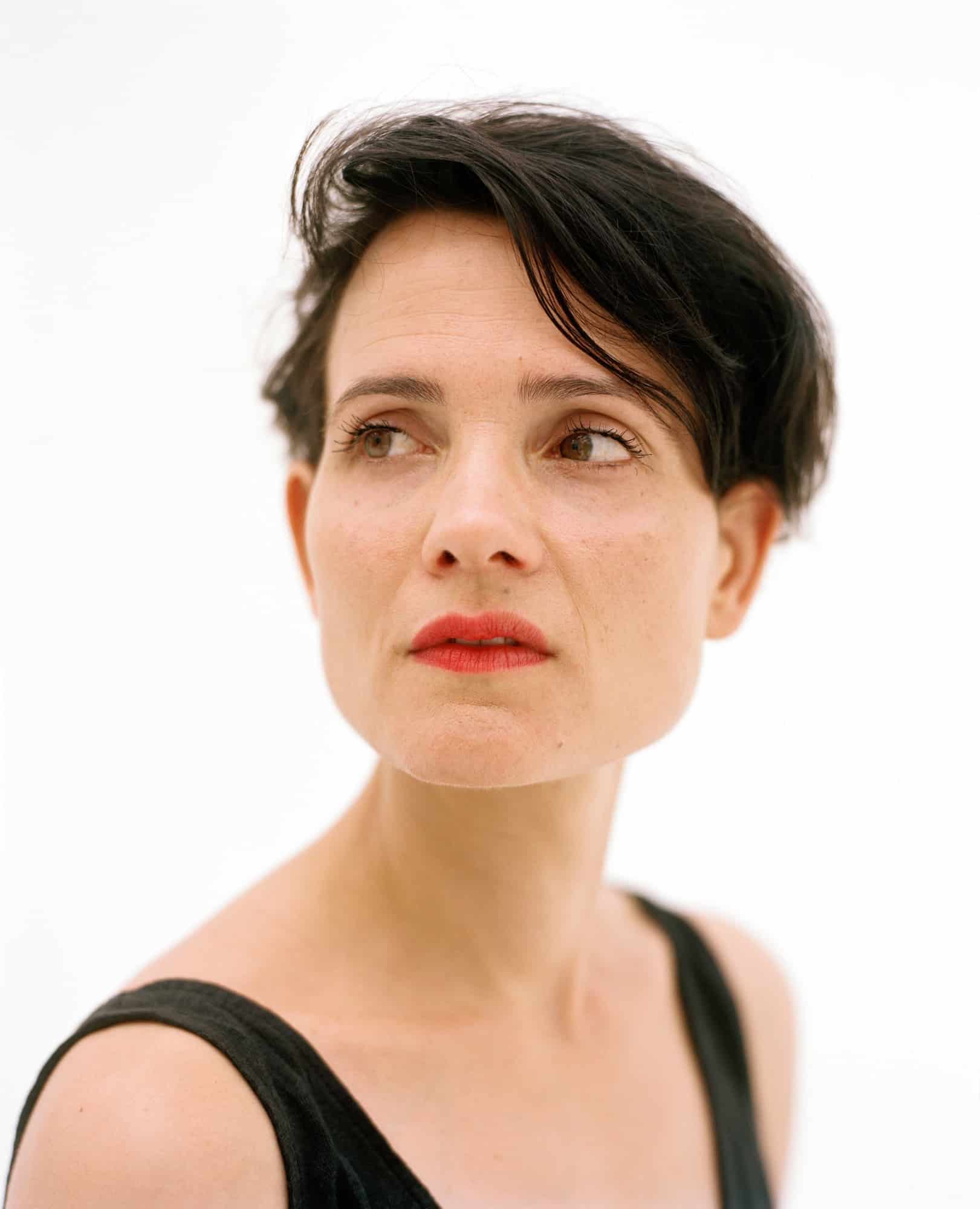‘Moeder af’ by Fen Verstappen: A Tender Farewell to a Mother Still There
What makes you a mother? Fen Verstappen wonders in her touching debut novel Moeder af (Mother Exit), as she has her first child, while her own mother suffers from a brain haemorrhage.
There is absolutely no lack of books about mothers in Dutch-language literature. Leo Pleysier lets his mother figure speak from the grave in Wit is altijd schoon (White is always nice), while Erwin Mortier’s book Godenslaap (Divine Sleep) follows a hundred-year-old mother reflecting on her long life, and in Gestameld liedboek (Stammered Songs) Mortier writes about his mother’s deterioration through Alzheimer’s. Tom Lanoye literally gives his mother a new voice in Sprakeloos (Speechless). And more recently, Ivo Victoria penned a tragicomic version of his mother’s life in Alles is OKÉ (Everything’s alright).
 Fen Verstappen
Fen Verstappen© Willemieke Kars
Rob van Essen has in turn been inspired by weekly visits to his mother, who suffers from dementia, material for his prize-winning book De Goede Zoon (The Good Son), although that novel does stray somewhat from the genre. Journalists such as Hugo Borst and Nico Dijkshoorn stay closer to reality with Ach, moedertje (Oh, Mother Dear) and Ooit Gelukkig
(Once Happy), respectively. Counting also Ernest van der Kwast, Arnon Grunberg, Maarten ‘t Hart and of course Adriaan van Dis, who takes his mother’s surname, there is almost no end to the number of writers in Dutch who honour their mother in literary form.
Yet in this list, there are no women. And remarkably, few debut authors. A mother book seems to be something for men of a certain age and standing, who often wait, it seems, for the person who gave them to life to die, or get close.
Not so Fen Verstappen (b. 1981), a copywriter from Amsterdam who has made her debut with Moeder af (Mother Exit). An autobiographical novel investigating what it is exactly that makes a woman a mother, in this book Verstappen scrutinises her two roles, both as a new mother and a daughter to her own mother, who has recently suffered from a brain haemorrhage after a fall in her studio and almost completely lost the ability to communicate.
Those rare life lessons her mother taught her are both beautiful and random
Verstappen tells her story in morsels; snapshots of a busy and hurried life slowly being relived. The main narrative centres on Paris fashion week, the last time she and her mother were really together. An image emerges of an independent, free-spirited woman, who grew up in the 1960s and ’70s, a fashion designer with a strong will of her own that she tries to pass on to her children. ‘Not excelling had been out of the question’ notes Verstappen – as the oldest daughter – about her own upbringing, almost laconically, though it has defined her whole life. Everything has to be perfect, while she feels that nothing she does is ever good enough. The mater familias is difficult, hard on her two daughters and others around her, all the while worshipping the ground her son walks on.
Yet Verstappen still manages to look back tenderly on her mother’s life. She does this in a sober style, interspersed with poetic and philosophical reflections. Those rare life lessons her mother taught her are both beautiful and random: ‘Hold on to love. Fly high but don’t fall. Live a tragic but cherished life.’ More practically: ‘Be sexy with a bare neck, never a bare belly.’

After she fell, her mother became a different woman. Still a mother, but also not. For Verstappen it feels as if she must get to know her all over again. And she might not succeed. How do you say goodbye to someone who is still around? It sounds like mourning, though Verstappen manages masterfully to avoid the banal and clichéd phrases.
Some things remain the same, such as her mother’s fiery temperament. A few hilarious passages ensue, which make you feel for the woman’s bravery: through the detached empathy with which she describes her, Verstappen cleverly highlights her mother’s most beautiful aspects. Eventually you forget her bossiness and obstinacy and you see her for her cheerfulness and warmth. ‘We tell each other that it is what parents do. That at some point they resign their function, confine their bodies and settle in the minds of their descendants, where they can become milder than they perhaps once were.’ Like that, a mother-child relationship never ends.
Excerpts from ‘Moeder af’, as translated by Paul Vincent
Excerpt 1 – IDENTITY
It wasn’t her birth that made me a mother, but the fact that the little girl just stayed with us. That they pulled her out of my body and four hours later said: ‘We’re finished now,’ and that they simply gave that fragile human being to us, without checking whether there was a three-point safety belt in the car and whether I didn’t throw things about when I got really angry. They didn’t ask anything, they resolutely drove the wheelchair round the front and off we went, on the way home, though while it was true that I had had a baby that very day I was far from being a mother, and so an hour after being discharged Jan and I stood in the living room. Thoroughly put out but with no one to call. For example: I think there’s been a mistake. There’s another child of yours here.
The baby stayed. That made me a mother. It stayed, and parenthood sedimented slowly on the sleepless nights, the messing around with the pushchair and the endless sniffing in the little neck. Things lasted thanks to the neighbours who rushed to us with joy, the other fretting insomniacs at the crèche, the letters addressed to parents/carers.
It took time to become a mother.
Just as not being a mother anymore requires time.
And so it’s not the brain haemorrhage that made you different, but it meant that you remained that different person. It’s the second Christmas in a flat without thresholds, the twenty-sixth cleaning session with the wheelchair, the comfortable training pants which meanwhile have their own shelf in the cupboard. It’s the new photo in your passport, the ritual waving at your old house, it’s the limited idiom of which part has already become a cliché. ‘Fine thing,’ you say as we push you ahead of us. You say it even when the wind blows you hair in your eyes.
It is the growing awareness that we can’t call you anymore.
One fine day you are finished as a mother. And one fine day you are an ex-mother.
Excerpt 2 – LIFE LESSONS FROM MY MOTHER # 1
Only people who please are liked by everyone. Make sure not everyone likes you. Think before you speak, never mimic anyone else. At most say: ‘You may think that.’
Distrust power. Rebel when you’re harassed by those wrongly in power, particularly conductors. Don’t let fifty-nine years be a reason not to come to blows with the transport police. Not even if it makes you miss a diploma ceremony.
Wear your heart on your sleeve. Dare to say that you find the younger daughter prettier than the elder. Don’t pretend to be nicer than you feel. Does all this result in relationship problems and steaming family conflicts? Empty a bottle of wine sitting on the sofa, eat a pound of cheese, cry and go to bed. Say sorry in about twelve years.
Excerpt 3 – CUNNING
Thirty days have passed, over four weeks in which we’ve been lifted with you out of life and planted in death’s waiting room, an extra-societal territory of adjustable beds, drip machines, breathing tubes and the kind request to disinfect our hands before brushing the hair from your forehead.
How long were you lying in your studio, before Stef found you? While I walk down the corridor with my telephone, I try in vain to regain time that I threw casually over my shoulder, wasted hours in which did not call you back because I didn’t feel like it, weeks when I felt too shitty to answer an email, months when I didn’t visit you because small new irritations touch on big old pain.
Every thirty days in intensive care I call my father, in order to re-evoke the last few moments when you were our mother. Every crumb that can feed the reservoir of memories of you, is reeled in, quoted. But our father does what he has been doing for eighteen months. Whenever I call him, he doesn’t pick up.
‘Dad, can you please contact me?’ I text him for that reason on day twenty. I attach a photo of the twenty-week echogram.
Fen Verstappen, Moeder Af, Das Mag Uitgevers, Amsterdam, 2019, 144 pp.












